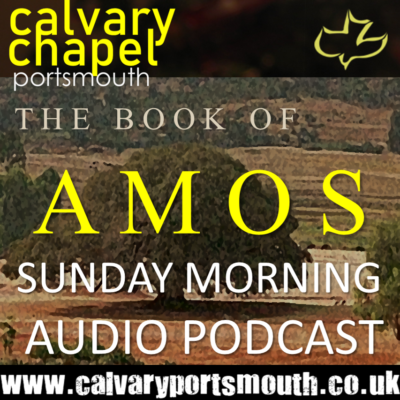This first teaching in this verse-by-verse study of the Book of Amos was given be Pastor Barry Forder at Calvary Portsmouth on 31st October.
On Sunday we began a new verse-by-verse study in the book of Amos.
The book of Amos is like an alarm clock going off, sharply bringing our attention to the time. It was that way when he spoke is message to Israel in around 765 B.C., and it will ring true for the days we are living in. God will not sit passively by and ignore sin. There comes a tipping point where enough is enough. God is not mocked, and His goodness demands Him to be just and bring judgment.
In chapter 1, Amos will begin pronouncing judgment on 6 of the nations that bordered Israel. These judgments would be fulfilled, probably, in Amos’ own lifetime – yet we see overtones of these judgments being ‘replayed’ today on the very same nations (or the people who now occupy the same territory).
In our introduction we noted the follow regarding this book:
• Key Verses:
- 5:24 – “But let justice roll down as waters, and righteousness as a mighty stream.”
- 8:2 – “Then said Jehovah unto me, the end is come upon my people Israel; I will not again pass by them any more,”
• Key Word:
- Punishment.
• Key Phrase
- “Thus saith Jehovah.”
• Key Thought:
- God’s justice demands punishment upon Israel for their injustice.
• Key Characters:
- Amos, the shepherd, commissioned by God to be a prophet to Northern Israel.
- Amaziah, the corrupt priest of the shrine of Bethel.
• The Author:
- It is “the words of Amos” the herdsman of Tekoa (1:1).
• Amos’ Home
- He was a native of Tekoa, a small mountain village 12 miles south of Jerusalem, 22 miles from Bethel
- It was a lonely, sparsely populated district overlooking the wilderness of the Jordan Valley and the Dead Sea, some 18 miles away.
• Amos’ Name
- Amos means “burden-bearer.”
- We must not confuse him with Amoz, the father of Isaiah.
- The fact that his father’s name is not mentioned suggests that he was probably from a poor, obscure family.
• His occupation:
- He was a humble shepherd of an ugly type of sheep with fine wool, called “noked” (7:14).
- He was also a dresser of sycamore trees, a poor quality of figs called mulberry figs.
- `”Dresser” means pincher. The unripe fruit had to be punctured to promote ripening. The fruit was infested with insects and inedible until the top was punctured so the insects could escape.
• His Character:
“Amos, a son of the wilderness, a man of granite make, stern, fearless, self-contained, of powerful, well-knit mind, vivid imagination, and lofty bearing.” G. G. Findlay.
He was deeply devoted to God and his law and had a special fondness for Deuteronomy. He alludes to it repeatedly
- See 2:10 (Deut. 29:5); 4:10 (Deut, 4:30; 30:2); 4:11 (Deut. 29:23); 5:11 (Deut, 28:30-39).
His preaching was blunt, courageous, and powerful, preaching repentance. He has been called “the plumb line preacher” (7:7). He is the John the Baptist of the Old Testament.
“He was educated and a first-rate orator, using the Hebrew without blemish” – John Waddey
Reason for Writing:
- 1. To announce coming judgment upon Israel because of their idolatry and sin.
- 2. To make plain to the people of Israel what the demands of God’s service truly are.
- 3. To remind Israel that God cares for all nations and exercises sovereignty over them.
- 4. To show that all nations are expected to respect such basic rules of human conduct as integrity, honesty, purity, and fairness.
- 5. To show that cruel, inhumane treatment of one’s neighbor will negate all worship, no matter how elaborate.
- 6. To remind Israel of Jehovah’s faithfulness to his covenant and law and their accountability to a practical observance thereof.
In his first two chapters, Amos pronounces judgment against eight nations.
• Amos prophesies God’s judgment on:
- Damascus 1:3
- Gaza 1:6
- Tyre (Phoenicia) 1:9
- Edom 1:11
- Ammon 1:13
- Moab 2:1
• And then Amos speaks of judgment on..
- Judah! 2:4
- Israel 2:6
“Each pronouncement of judgment is introduced by the words, “For three transgressions … and for four.” Baxter explains this Hebrew idiom for us: The phrase is not to be taken arithmetically, to mean a literal three and then four, but idiomatically, as meaning that the measure was full, and more than full; the sin of these people had overreached itself; or, to put it in an allowable bit of modern slang, they had “gone one too many,” they had “tipped the scale.” (W McDonald: Believer’s Bible Commentary)
May you be blessed and encouraged by this study.


